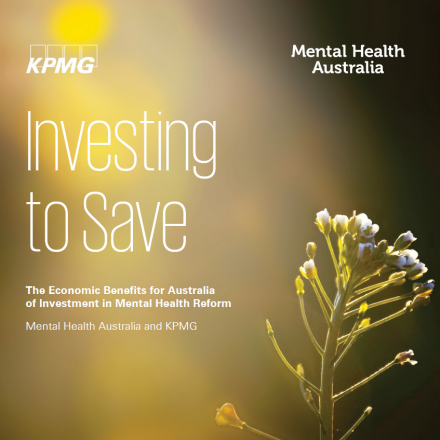Perspectives - September 2015

Welcome to the September edition of Perspectives, our online magazine where we present ideas, essays, and articles about what is happening in the mental health space.
In this edition’s feature article, Mental Health Australia CEO Frank Quinlan provides his opening statement to the Mental Health Hearings as part of the Senate Select Committee on Health, outlining where the sector is regarding reform to mental health. This is further examined in a piece on reform by Frank, ‘The bits in between’.
We also have articles from our members, including a discussion about the development of workplace mental health first aid guidelines from Mental Health First Aid Australia; a look at the impact of childhood family violence on adult mental health; a piece from SANE Australia about improving the physical health of those who experience mental illness through the Peer Health Coaching Program; a look at the potential impact of mental health nurses working with NSW Police to manage mental health-related incidents; and information about the A-B-C guidelines for positive mental health developed by Curtin University.
Other content from Mental Health Australia includes a brief on the ‘Friends of Mental Health Australia’ initiative, as well as a short piece on Frank’s experiences at the Garma Festival in the Top End of Australia.
Don’t forget, we are always looking for input from our members. If you have a perspective about mental health that you’d like to share, we want to hear from you. Contact us via communications@mhaustralia.org
We’d also like you to engage with us. Do you have a comment on any of this month’s stories? Join the conversation on Twitter @ https://twitter.com/AUMentalHealth
True reform requires partnership and agreement
Feature Story By Frank Quinlan, CEO, Mental Health Australia
A new National Mental Health Plan and reform of the system that goes with it, can only occur if everyone plays a substantial part in the process. Reform must be designed in tandem with the mental health sector and must be led by First Ministers. In this article, Mental Health Australia CEO Frank Quinlan outlines the issues facing governments and the sector in regards to responding to the National Mental Health Commissions Review, and implementing the NDIS.
![]()
The bits in between
Story By Frank Quinlan, CEO, Mental Health Australia
Mental health reform in Australia is currently impacted by many government processes. Much of the work currently conducted is being done with an eye on the future state of our mental health system. However, consideration needs to be given to the arrangements needed to ensure services continue while the new system is being created. Mental Health Australia CEO Frank Quinlan looks at the need for transition planning.
![]()
2015 Garma Festival
Story By Frank Quinlan, CEO, Mental Health Australia
Mental Health Australia CEO Frank Quinlan recently joined a delegation of leaders from the mental health sector to attend the Garma Festival in the Northern Territory. In this article Frank shares his experiences and photos from this important Indigenous cultural event.
![]()
Calling for Friends of Mental Health Australia
By Mental Health Australia
Mental Health Australia has recently launched a new non-voting individual membership category, allowing everyone the opportunity to support the mental health sector in Australia. For a small fee, anyone can become a ‘Friend of Mental Health Australia.
![]()
From our Members
The lasting impact of childhood family violence
Dr Cathy Kezelman AM, President, Adults Surviving Child Abuse
Australia’s first royal commission into family violence will wrap up public hearings after four weeks of evidence from victims, advocates and support services. We’ve learnt that the impacts of early experiences of family violence and child abuse are often both significant and long-term. However, until recently, society has continued to ignore and stigmatise the daily challenges often experienced by the five million Australian adults living with the effects of childhood trauma and abuse.
![]()
What works in the workplace? Offering mental health first aid to help a co-worker
By Nataly Bovopoulos, Deputy CEO, Mental Health First Aid Australia and PhD Candidate, University of Melbourne
Most people now know that mental health problems are common and disabling. It is no different in the workplace, where the annual costs to the economy are often cited in be in the billions. Unfortunately, there may not be many people in a workplace who would know how to offer help to a co-worker who is developing depression, troublesome anxiety or a substance use disorder. Fortunately there are more programs becoming available to train employees in how to offer help a co-worker.
![]()
Mental Health Nurses a vital part in police crisis response
By Adjunct Associate Professor Kim Ryan, CEO, the Australian College of Mental Health Nurses
When a mental health crisis occurs, often the first people on the scene are the police. However the need for trained mental health professionals as first responders is key. In this article Kym Ryan, CEO of the Australian College of Mental Health Nurses, discusses a new plan by NSW Police to ensure mental health nurses are part of any first response to reported mental health related crises.
![]()
The ABCs for good mental health
By Amberlee Laws, Mentally Healthy WA, Curtin University
We hear a lot about what we can do to prevent physical illnesses, but most of us rarely think about the sorts of things we can do to protect and promote mental wellbeing. The Act-Belong-Commit campaign is a world first mental health promotion program developed by Curtin University in Western Australia. The campaign is unique in that it targets the whole population and is focussed on mental health, rather than mental illness.
![]()
SANE Australia, Peer Health Coaching Program
By SANE Australia
People with a severe mental illness have a significantly reduced life expectancy, often due to an additional poor physical health situation. In this article, SANE Australia discusses its new Peer Health Coaching Program bringing together people with a lived experience of mental illness to model recovery and use coaching techniques to encourage change.
![]()




